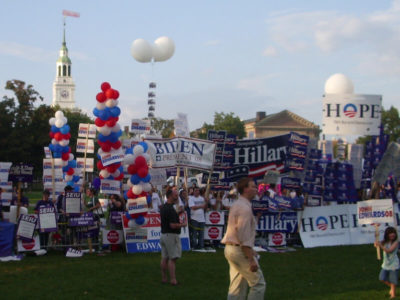With election day just seven months away, media coverage has kicked into hyper-speed. From your iPhone to you TV screen, you can re-live the highlights of every debate and campaign through ridiculous memes and Saturday Night Live parodies, Last Week Tonight and The Daily Show. The topic has everyone buzzing about around the country, and as November approaches, people seem anxious to determine the best candidate to take on the oval office.
Many of the debates shown on screen, however intense or entertaining to watch, touch on controversial topics that you may be more or less familiar with. Unfortunately, many college students choose to turn a blind eye. According to Civic Youth, only 19.9 percent of people aged 18 to 29 voted in the 2012 federal election—AKA the lowest youth turnout rate ever in a federal election. What’s up with that?
“[College students] don’t feel that candidates represent them… They don’t feel that politics matter in their daily lives,” University of Maryland’s Director of the Center for American Politics and Citizenship Stella Rouse said. “They have other priorities that they are trying to deal with on a day to day basis and so there’s a lot of disconnect.”
As it turns out, the more young voters refuse to participate, the less time candidates spend on the issues that are important to them. “Unfortunately, politicians haven’t done a good job of reaching out to millennials, in part because they look at them as an unengaged part of the electorate,” said Rouse.
It’s easy to hide in our college bubble, only concerning ourselves with grades and where to pregame on a given night. But issues like foreign policy or social security will indeed become a reality the day we complete our degrees and become “adults.”
Honestly though, young people are concerned with the country’s direction. We’re interested in health care, climate change and student debt. Actually, youth involvement in politics has peaked. During the presidential election with Barack Obama and Mitt Romney, most of Obama’s votes came from the youth pool. In other words, without the support of college- aged voters, Romney could’ve sat in the presidential seat today. Votes do matter; they always have.
So where do we go from here? How can college students begin to make a positive impact for America?
Professor Hamner of the Political Science Department of the University of Maryland explained that college is a great place to get in the loop because so many young people want to share their thoughts. “[Voting] is an expressive act. People vote to attach themselves to an outcome.”
Viral videos, hashtags and memes on social media make the information you need as accessible as your ex’s Facebook page.The way you spend your free time is up to you. “Students transmit political participation though their network. A lot of political activities be-come social in nature. You get experience along the way and its part of the way to solidify your own beliefs.,” Hamner said.
Let’s be real: Diving into the ocean of politics feels intimidating. With so much to learn about and too many red-faced, narrow-minded hotheads we’d rather not engage with, many of us decide against joining in on the conversation.
To dip your toes in without getting swallowed whole, Professor Rouse suggested taking baby steps. “I don’t think that it’s necessary [to establish a political orientation while in college]. I think that there’s a lot of pressure put on young people from their parents, perhaps from friends and people around them to have a very coherent political belief system,” Rouse said. “I think the time for being in college is where you should probably explore different concepts of political beliefs and take that time to find themselves in terms of what their beliefs are.”
So how can you begin to explore those political beliefs? Take a class! Rouse said, “We try to relate what we teach to how it affects [students’] everyday lives, how decisions made by their government on all levels, not just the federal government, but local and state government and what happens internationally honestly affects their lives, and how they can make a difference.” No better place exists to explore your ideas than a controlled classroom setting where you can speak freely with your peers.
On November 4, 2016, one candidate will win the presidential election, and on January 20th 2017, the words that one candidate promised in his or her campaign will matter. As an American citizen, you have a right to make your voice heard. You have a right to vote and make your opinions matter. Now go make a difference.



















